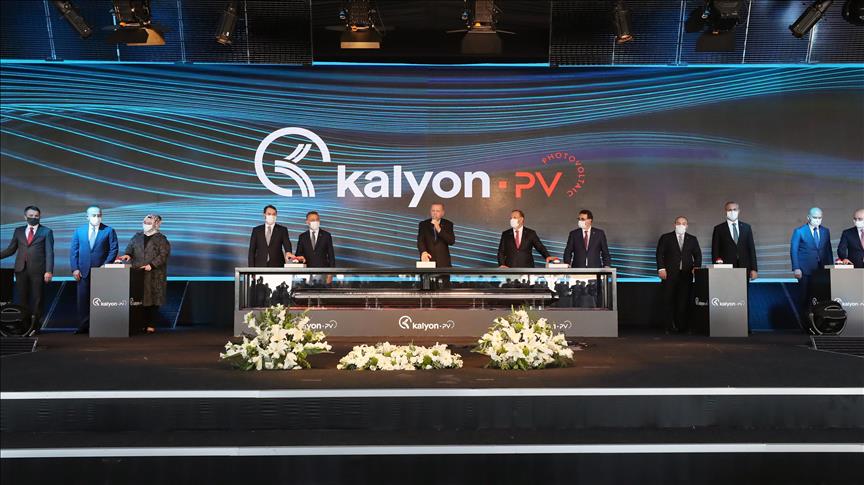Turkey's first integrated solar ingot-wafer-module-cell production factory started production on Wednesday, according to Energy and Natural Resources Minister Fatih Donmez on Wednesday.
Speaking at the opening ceremony of the factory established by Kalyon Solar Energy Technologies Production Co., Donmez said the factory's foundation was laid six months after the Renewable Energy Resources Zone (YEKA) tender was held in 2017.
The Kalyon-Hanwha consortium won the first solar energy YEKA tender bid on March 20, 2017, for the construction of the country’s biggest solar power plant in Karapinar in the Central Anatolian region at cost of $0.0699 per kilowatt-hour. However, Hanwha did not continue with the project but China Electronics Technology Group Corporation (CETC) stepped in to construct the facility.
Under the tender rules, solar components are to be produced locally, and consequently, the construction of the module cell factory to produce four units - ingot, wafer, module and cell, was inaugurated at a groundbreaking ceremony in the capital Ankara in December 2017.
The module cell factory, realized with a $400 million investment, will help eliminate nearly $100 million of solar panel imports per year, and the R&D center in the factory will also employ 100 researchers, according to Donmez.
He said that Turkey would now be included on the list of 20 other similar integrated solar panel manufacturers, most of which are located in China.
-New plant to supply Turkey's biggest solar plant, Karapinar
'The first panels produced in this factory, which has more than 70% domestic production ratio and 500 megawatts of solar cell production capacity per year, will be used in Turkey's biggest solar power plant in Konya's Karapinar,' he declared.
Karapinar solar power plant, which will be realized with a $1 billion investment, will have an annual electricity production capacity of 2.6 billion kilowatt-hours. Starting from September, the plant will become operational in increments of 40 megawatts per month to become fully operational in 33 months, according to Donmez.
'With Karapinar coming fully online, the share of solar energy in our electricity production will be up 25% eliminating nearly 2 million tonnes of CO2 emissions per year,' Donmez said.
- Solar energy in Turkey
Donmez also noted that the share of renewable energy in Turkey's installed capacity reached 50.3% as of the end of July with renewable energy constituting half of total capacity, which came online from 2002 to 2020.
'Solar energy, which did not have any place in our energy portfolio until 2013, today is at the level of about 6,232 megawatts. In 2019, solar energy provided electricity to 4.1 million households. Solar power plants broke a monthly record in May this year by providing 5.6% of electricity production,' Donmez explained.
He stressed that Turkey, in just six years since 2014, became the ninth country in the world and third country in Europe to boost the most installed solar energy capacity.
'In order to attract more investment and help small and medium-sized investors to enter the market, we will hold the first mini-YEKA tender in October. With a total capacity of 1,000 megawatts, 74 tenders will be held with capacities of 10, 15, 20 megawatts each in 36 districts,' he added.
On Oct. 7, 2019, Donmez announced Turkey's plans to hold YEKA tenders for solar energy in a new form, known as 'mini YEKA'.
- Factory to employ 1,400 people
Cemal Kalyoncu, board chairman of Kalyon Holding, also disclosed that the factory, which will cover an area equivalent to 2,600 football fields, will be the first and only factory to allow ingot-wafer-module-cell production under a single roof.
'Our factory has 100,000 square meters of indoor space and will provide employment for 1,400 people,' Kalyoncu noted, adding that they aim to boost the solar panel factory's production capacity to 1,000 megawatts in six months.
By Ebru Sengul Cevrioglu
Anadolu Agency
energy@aa.com.tr


